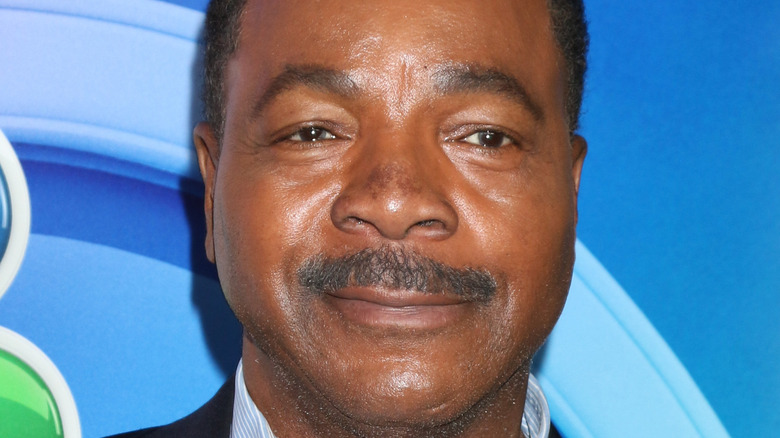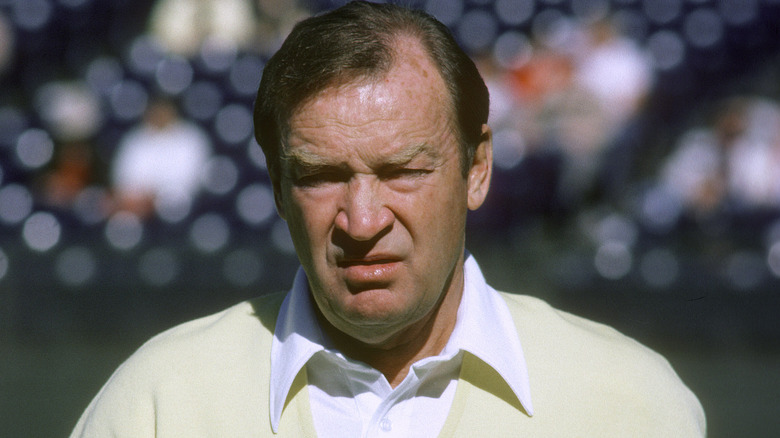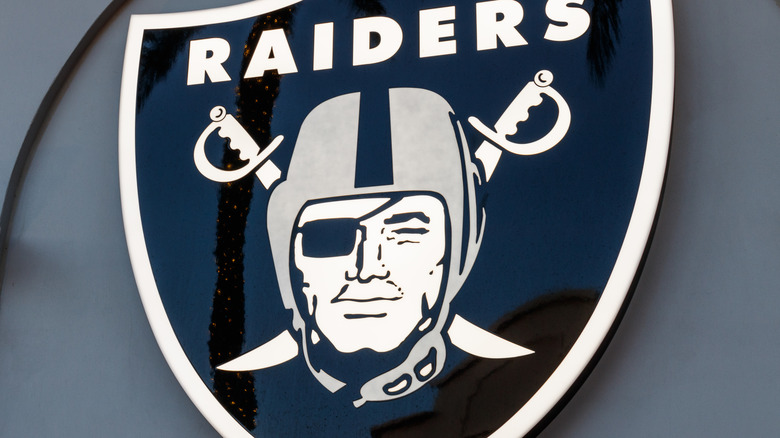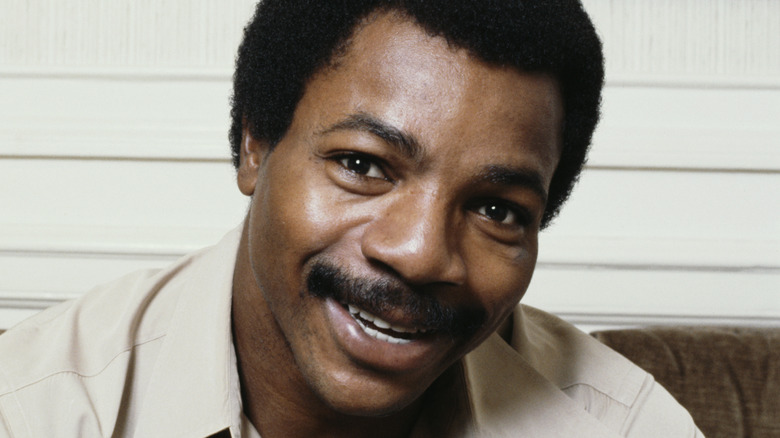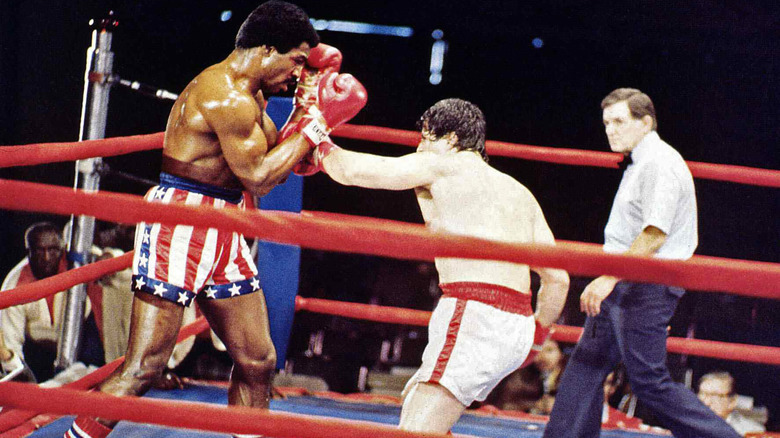Carl Weathers' Unexpected Career Before He Became Apollo Creed
Since the premiere of the first film in the series in 1976, the "Rocky" franchise has been comfort food for any sports fan looking for a feel-good movie about an average guy who beats the odds to become the best in his sport. And while the narrative of Philadelphia native Rocky Balboa (Sylvester Stallone) being the ultimate underdog-turned-world-champion is a key element of many of the main franchise's entries (i.e. the ones that have his name in the title), you can't talk "Rocky" films without talking about the Big Bad of the series' first two installments, the talented, yet cocky Apollo Creed (Carl Weathers). He is the antithesis of the soft-spoken Rocky, making loud boasts akin to wrestling promos not unlike those delivered by the late Muhammad Ali, but only turned up to eleven. Then comes the face turn from this once-hated heel, as seen in "Rocky III," and finally his tragic in-ring death at the hands of Ivan Drago (Dolph Lundgren) in "Rocky IV."
Thanks to Weathers' acting skills, Creed is an over-the-top, yet ultimately believable heel in the first two "Rocky" movies. It certainly helped that the actor boasted a chiseled physique that made him look even more credible in his role as the top heavyweight boxer in the sport ... until, of course, his loss to the Italian Stallion at the end of "Rocky II." Given his impressive build, it may not come as a shock that Weathers was a fine athlete in his youth, but what may be more surprising is the sport in which he attempted to carve out a career before Hollywood came calling.
Carl Weathers' road to pro football started during his childhood in New Orleans
Well before he became known to the world as Rocky Balboa's rival-turned-friend Apollo Creed, Carl Weathers had a brief career as a linebacker for the Oakland Raiders. But how did he get started on the road to professional football in the first place?
In a 1979 interview with The Washington Post, Weathers looked back on his childhood in New Orleans, where, at a young age, he found that his artistic aspirations were not a good fit for the tough neighborhood he grew up in. "Certain things I was drawn to — like doing a little acting or singing in the choir — had no credibility on the street," he recalled. "And I was too ignorant and intimated to try to explain why they seemed valuable to me. The other guys would say, 'What is this, man?' and all I could was mumble."
It was only in the eighth grade when Weathers finally gave in to peer pressure and started playing football, though at that time, he claimed, he was motivated by his observation that the attractive girls were mostly drawn to the athletes in his school. He ended up playing well enough as an eighth-grader to get a scholarship to St. Augustine, an all-Black Catholic high school, and while he liked it there, he ended up moving to California after his junior year.
Weathers played college football under a coaching legend and alongside another future thespian
As Carl Weathers related to The Washington Post, he was impressed by how progressive California was in terms of race relations that he decided to stay in Golden State after a vacation with his grandmother ahead of his senior year in high school. It was also in California where he played college football, first for Long Beach City College, then for San Diego State, which was coached by would-be NFL coaching legend Don Coryell (pictured above). As noted by Bleacher Report, Coryell gained a reputation as a brilliant offensive coach while helming the Aztecs, winning 104 out of 125 games between 1961 and 1972. His 1969 Aztecs were particularly impressive, going undefeated as they led the NCAA in total offense, passing, and points per game and gave college football fans a dose of what would be known as "Air Coryell" during his time as an NFL coach.
While Coryell made his name as an offensive genius, Weathers played on the other side of the ball, suiting up as a defensive lineman on that undefeated 1969 San Diego State team. Defensive stats for 1960s college football players are hard to come by, so it's hard to say how much of a pro prospect he was on paper. However, it's interesting to note that Weathers was teammates with another would-be pro football player who would make the transition to acting — fellow defensive lineman Fred Dryer, who played 13 seasons in the NFL and would later be best known as the titular Sgt. Rick Hunter in the 1980s cop show "Hunter."
He played two seasons for the Oakland Raiders as an undrafted free agent
While would-be TV cop Fred Dryer preceded Carl Weathers into the NFL as a first-round draft pick in 1969, the future Apollo Creed wasn't picked anywhere near the first round when he became eligible for the NFL Draft in 1970. In fact, he wasn't drafted at all — period. At 6-feet-2-inches and 220 pounds, Weathers wasn't large enough to play on the defensive line in the pros, so he requested to be switched to linebacker after he was signed by the Oakland Raiders as an undrafted free agent that same year (via The Washington Post).
Having just officially joined the NFL in 1970 following the league's merger with the AFL, the Raiders were a formidable team in the early '70s, one that was led by a legendary coach whose name would eventually become ubiquitous among sports video gamers — John Madden. Given how talented the Raiders were, it wasn't surprising that Weathers didn't get much playing time during his two seasons with the organization. Wearing jersey No. 49, the young linebacker was used in seven games in 1970 and just one game in 1971, not even getting to start a single contest for the Silver and Black. With that, his NFL career was over, but that wasn't the end of his time in professional football.
Weathers also saw action in the CFL
Following his time in the NFL, Carl Weathers moved up north to play in the Canadian Football League, where he got substantially more exposure but didn't emerge as a star player either. According to his StatsCrew page, Weathers played 18 games across three CFL seasons (1971-73) for the BC Lions, and while it isn't known how many tackles he registered during his CFL stint, he picked up one fumble recovery for -2 yards. Not really anything to write home about, but at least he stuck around for three seasons. Per The Washington Post, Weathers wrapped up his pro football career with the Detroit Lions, but as his Pro-Football-Reference page suggests, he didn't make it past training camp or the preseason.
In his interview with The Washington Post, Weathers admitted that he was skilled enough to play in the pros, but didn't have the work ethic to take it up another few notches. "I was good enough to fool 'em, but never dedicated enough to become a great player," he shared. "Up to a point everybody can capitalize on the fact that nobody knows what's goin' on. I could make coaches believe I could do what they wanted me to do, but that's not the same as pushing yourself. The great ones are willing to work harder."
Almost three decades later after that Post interview, Weathers had something similar to say about his football career to The Sporting News in 2007 (via Yahoo Sports), but aside from fessing up about his subpar work ethic, he was more direct in admitting that he was distracted by the lure of an acting career. "My one eye was on football, and my other eye was on Hollywood," he said.
He put his college degree to use and became a full-time actor in the mid-'70s
Fortunately for Carl Weathers, he had a very good Plan B waiting in the wings after pro football, as his love for performing never went away after his childhood in the Big Easy. It is at this point where it becomes extra-relevant that Weathers was a theater major at San Diego State, and that he didn't see football as a long-term career option. "I was still looking to hop out of football as soon as I made some headway with acting," he told The Washington Post. It's also worth noting that he was still playing pro football when he made his first appearance as an extra in the 1972 film "The Candidate."
After a few fibs here and there to help boost his resume, Weathers got himself an acting coach and an agent, and by 1974, he got his first notable role in the blaxploitation film "Bucktown." His IMDb page also shows that he made guest appearances on a number of television shows across varying genres, including "Good Times," "Kung Fu," and "The Six Million Dollar Man," before landing the role that would define his career. That role, of course, was that of Apollo Creed in the "Rocky" franchise, and it's safe to say he was the perfect foil for the film series' titular hero ... and later a true friend to the onetime underdog everyman from the City of Brotherly Love.
